 Keke Design
© 2026 Keke LE Design
Keke Design
© 2026 Keke LE Design
 Keke Design
© 2026 Keke LE Design
Keke Design
© 2026 Keke LE Design
2019
Alibaba Group
Digital Product Design
Post 95's and 00's generation are becoming the main force of consumption in the next 10 years. Born under the Internet era, they have different consumption concepts and habits. Whether the form of mall-type e-commerce product, which has been developed for decades, is suitable for the younger generation.
To figure out the answer, I collaborated with a colleague of the consumer operation department to survey the generation, through opportunity insight, analogy analysis, and value judgment, we proposed a new type of e-commerce product.
Tisland is a social e-commerce product based on and for consumption. Compared with the closed relationship of matching a consumer and goods in mall-type e-commerce, the social-type builds the open one where consumers discover goods through the group-self building cultural community, and consume them with embedded Alibaba's products like Taobao, Eleme, Youku, etc. The “goods” means everything we can consume like music, food, place. The recommendation and endorsement of a brand or commodity would be transferred from the official roles to the consumers themselves, which not only helps increase the conversion rate but also gives space for the groups to spontaneously incubate the long-tail market.
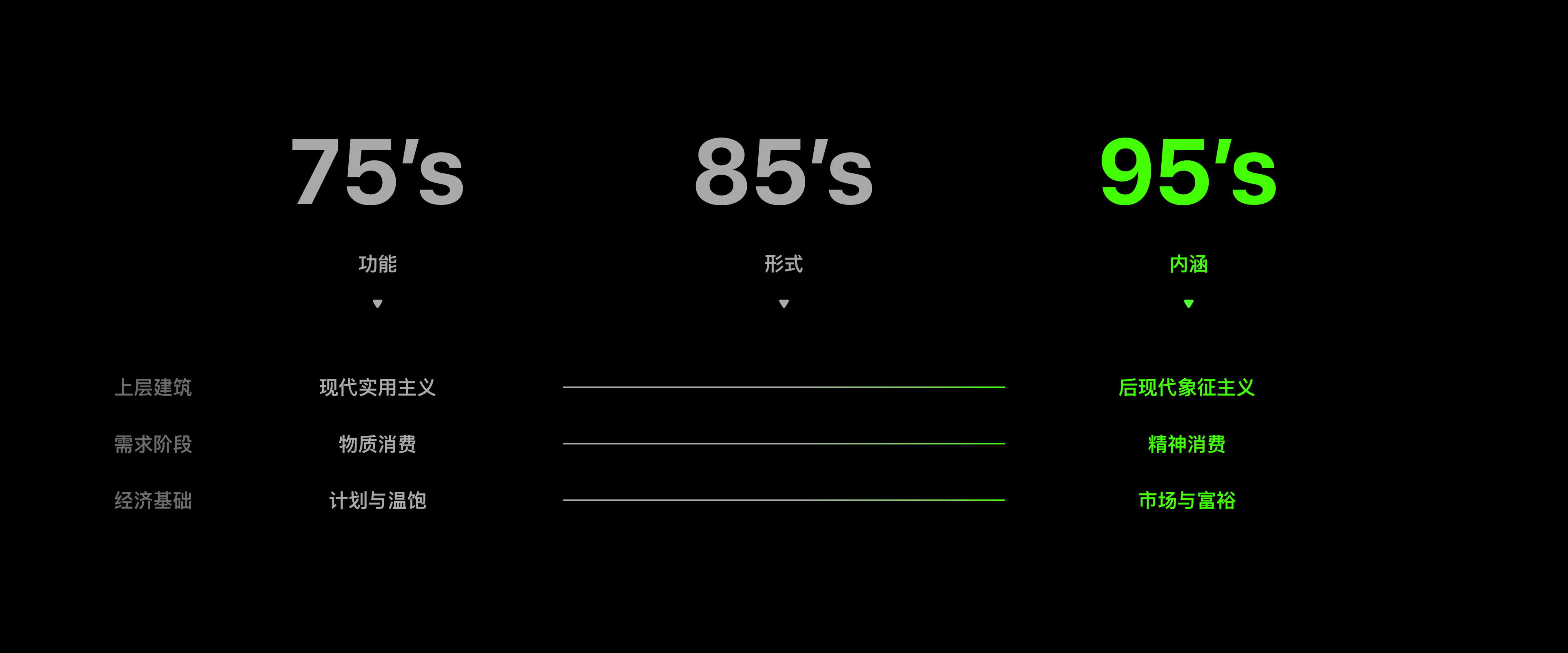
Consumption Concept Evolvement of Chinese Market ↑
In the 1975s, the late-era of planned economy, consumption choices were lacked. People purchased commodities mainly for the practicality. The concept was gradually changed to be personality and style pursuing in the 85's generation with the material’s getting richer thanks to the Chinese economic reform. Nowadays, the younger generation is used to co-producing and consuming content through the Internet, forming groups and trends spontaneously and quickly. What they consume is "meaning", a feeling of cultural identity and group belonging.
The Essence of Consumption Concept of Meaning ↑
The internal logic of consumption concept of meaning: Meaning > Culture > Group > Content > Consumer Goods. Meaning is cultural interpretation in a certain context, and the culture is a common ideology of a group of people. They co-create and consume contents with this meaning, and through which ultimately pay for those materialized or non-material goods to build a personal image or cultural label.
The Feasibility of Alibaba to Be A Comprehensive Contextual Platform ↑
Segmented e-commerce platforms capture specific target groups of people, such as Dewu to sports fashion groups, Bilibili to ACG groups, and in these independent cultural contexts people are converted to content consumption and commodity purchases. Consumption records are the most realistic data to characterize a person's taste image. Since Alibaba's platform ecology covers consumption preference data and commodity content supply in almost all fields of clothing, food, housing, transportation and play, it is possible to collect these data and supply to create a large and comprehensive contextual platform to aggregate groups from various fields for content consumption.
The E-commerce Platform Shopping-guide Model Transformation ↑
The e-commerce platform shopping-guide model will change: from a centralized broadcast-way mall type to a decentralized crowd square type. The mall type is a closed relationship between consumers and commodities based on algorithm matching, with the platform or brand official endorsing consumer products. The square type is an open relationship between consumers and consumers, discovering groups then goods with the group endorsing consumer goods, based on cultural group identity.
ABH Theory of Cultural Evolution ↑
According to ABH cultural evolution theory, cultural evolve from long-tail advanced culture from long-tail group incubation > consumption scale up > migrate to mainstream culture > cottage culture derived. Behind the long-tail culture is the long-tail population, that is, the new consumer population, the new market supply. The missing thing is the new scene, this scene is a decentralized demand self-growing field that the mall type as a typical brand mainstream culture field can't cover completely.
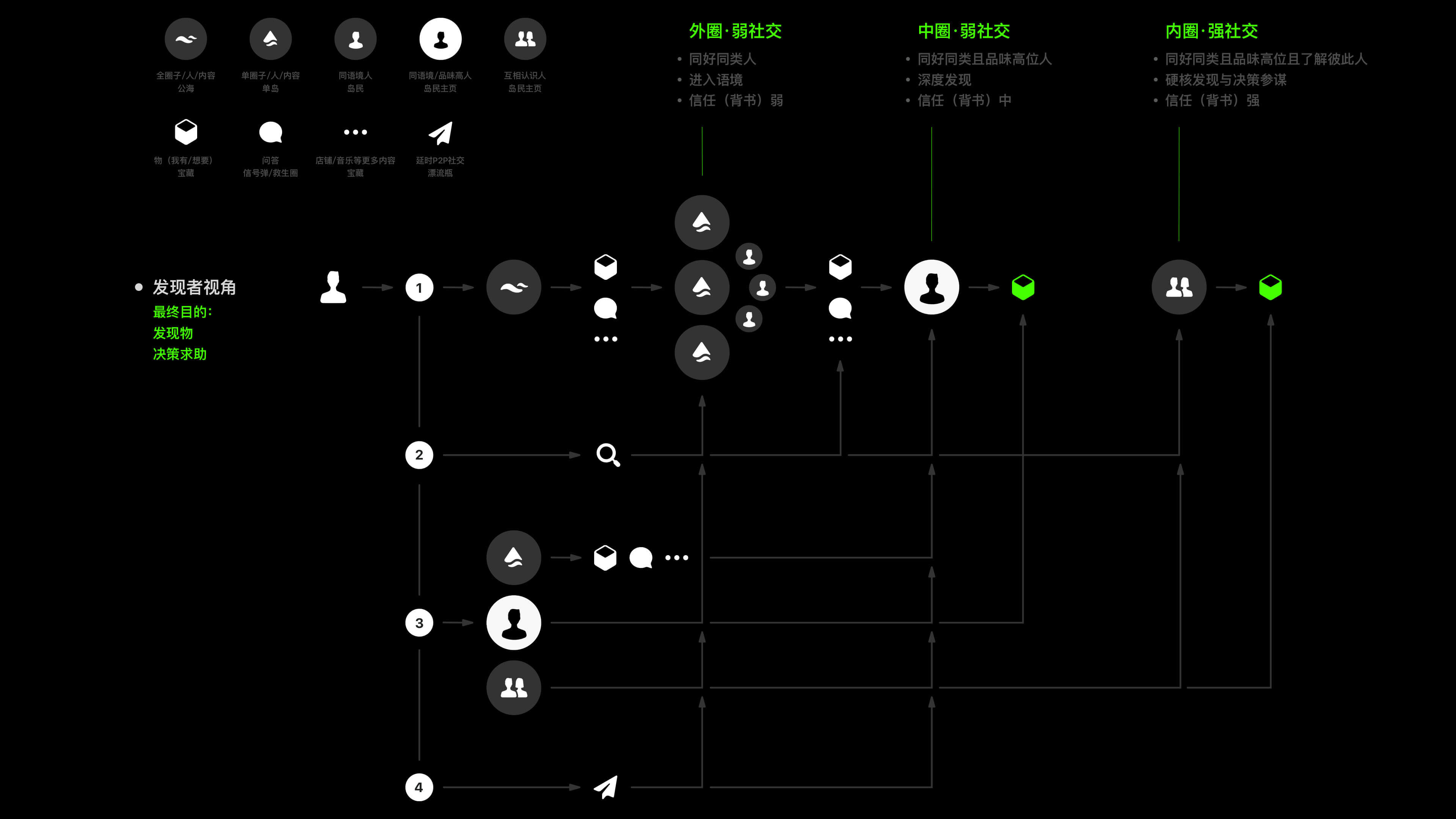
Product Using Path ↑
Users in this platform are both discoverers and publishers. Users discover consumer products by discovering groups of people with the same context and higher taste. At the same time, users make multiple self-definitions and group join by publishing consumed products or content.
The information structure is divided into three circles:
1. Outer circle, weak social.
Users enter a certain cultural context and discover fellow users, at this time the trust endorsement of direct content transformation is weak.
2. Middle circle, weak social.
Users browse through the content and discover users with better taste or knowledge than themselves, at this time the trust endorsement formed by the user's content is medium.
3. Inner circle, strong social.
Users make friends with those who have better tastes than themselves, which is a strong trust endorsement for users' final discovery and decision making.
Therefore, from the discoverer's perspective, 4 paths are designed to help users eventually reach the inner circle:
Path-1.
By browsing the recommended content on the public multicultural home page, entering a single cultural context for further content browsing, topic interaction, and member discovery, and eventually discover consumer products and convert them.
Path-2.
By searching and discovering single culture contexts, contents and fellow users, and eventually discover consumer goods and convert them.
Path-3.
By following monocultural contexts, fellow users and friends, discover consumer goods and convert them.
Path-4.
Through P2P function of "Floating Bottle" (matching with other users who have consumed the same consumer goods), discover more His or her consumer goods and convert them.
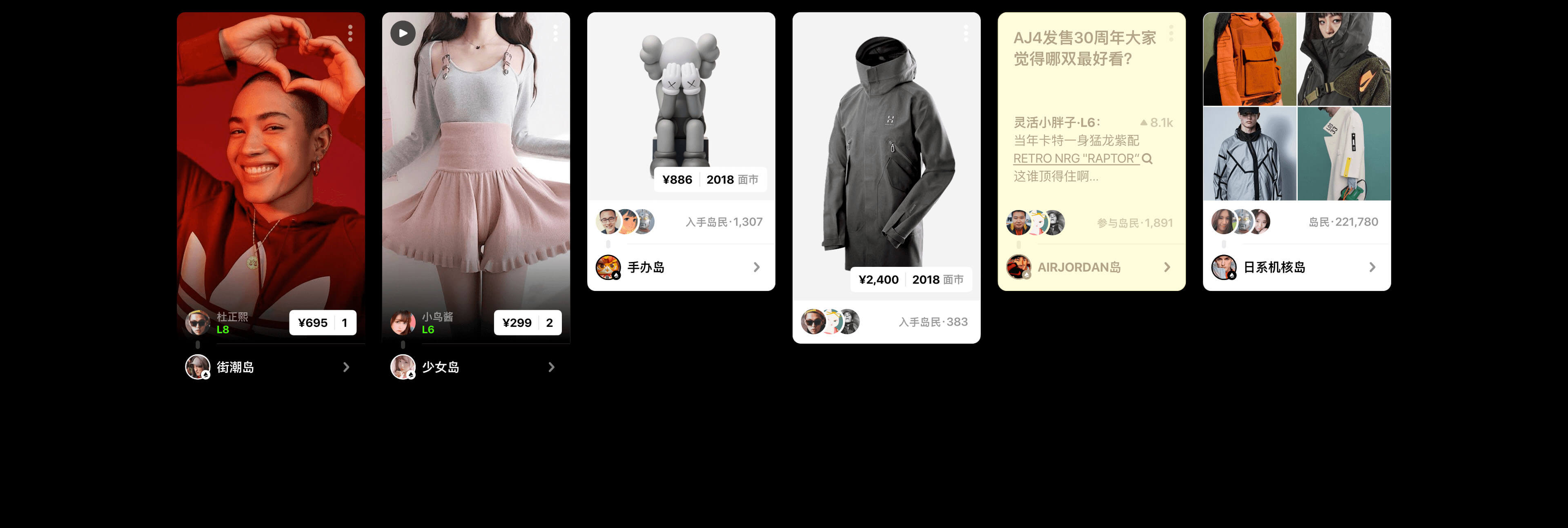
Tisland © Home Page 公海与群岛 ↑
The home page is divided into islands map mode and feeds mode, with tab switching to see recommended, hottest, and newest islands (i.e. monocultural contexts). The contents is then divided into 4 card types:
1. Images and videos:
Consumed contents or commodities with images and videos posted by islanders (i.e. users).
2. Consumer commodities:
Treasures (i.e. consumer commodities) endorsed by a community of fellow users.
3. Topics:
Topics discussed from a monocultural group.
4. Boards:
Entrance of a certain monocultural context.
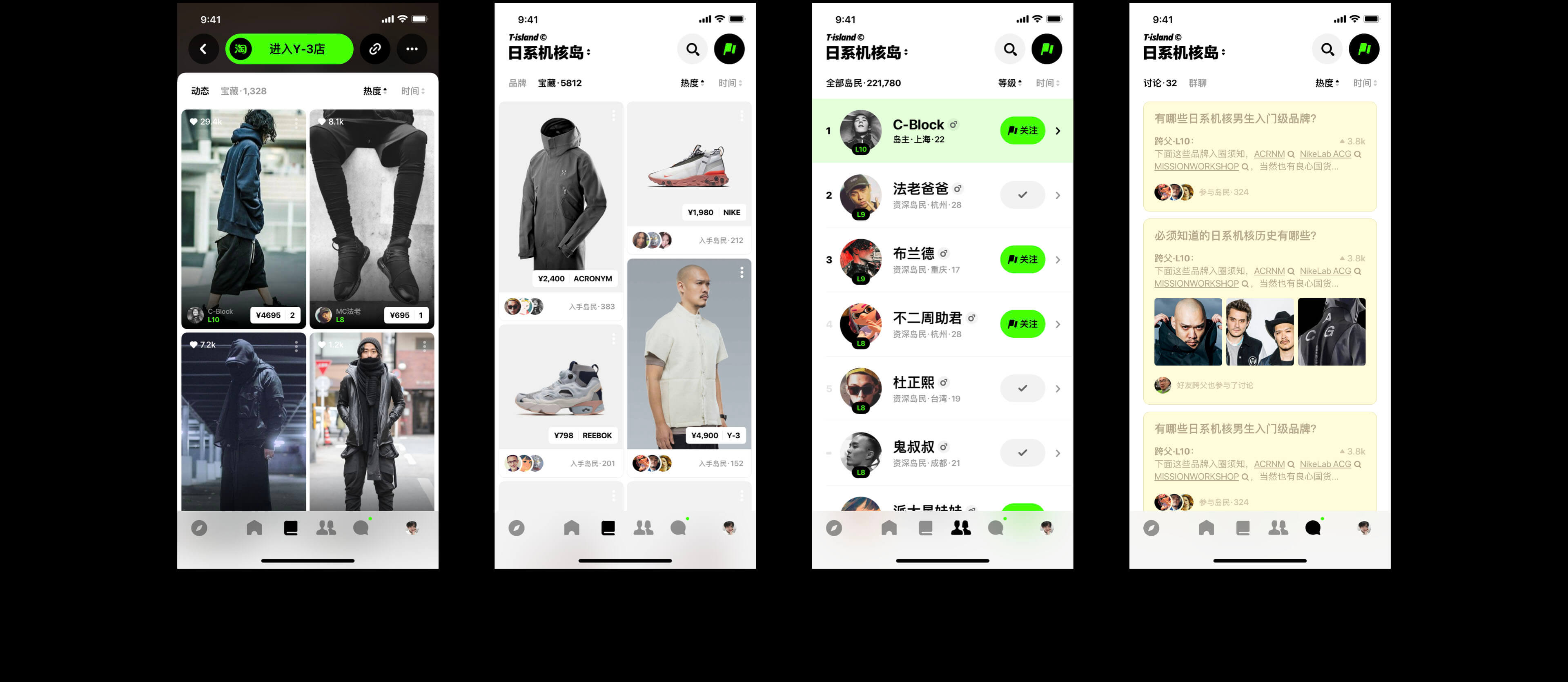
Tisland © Monocultural Page 单岛 ↑
Mono-islands (i.e. monocultural contexts) are divided into feeds, brand walls, islander lists, and topics. Among them, the brands in the brand wall are automatically calculated from all the brands mentioned in the content posted on the island, and users can quickly get to know this culture by browsing the brand detail page. Also the islanders on each cultural context island have ranks, based on activity, number of content posted, and number of interactions.
Tisland © Navigation ↑
Islands navigation page helps users to quickly landing any cultural island, it is divided into the current island, recently landed islands, and all islands index, users can find different cultural islands by filtering the population, time, and name.
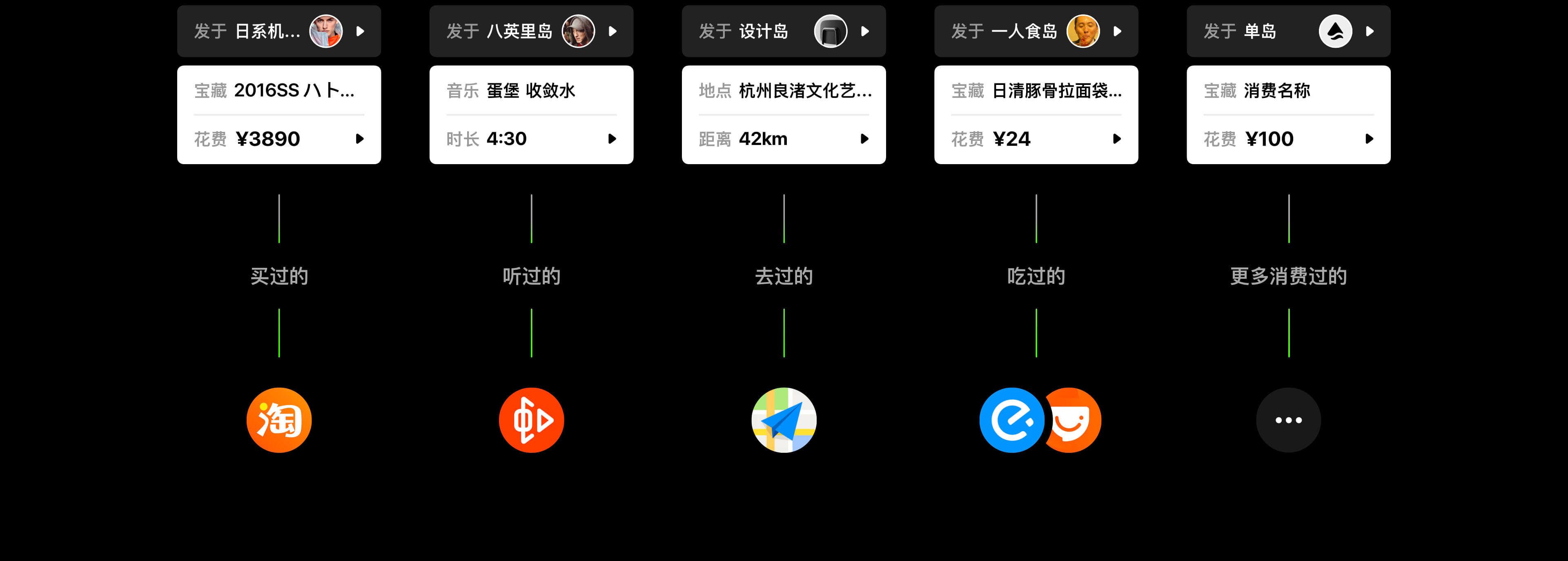
Tisland © Post Detail ↑
Content posted by users can be automatically linked to records of content consumed in Alibaba eco-products, helping other viewers to achieve corresponding conversions within the app, such as direct purchases, listening to songs, navigating locations, etc.
Consumed content includes:
Commodities purchased - Taobao & Tmall
Places visited - Amap
Resturant enjoyed - Eleme
Music listened - Xiami
Event took part in - Damai
...
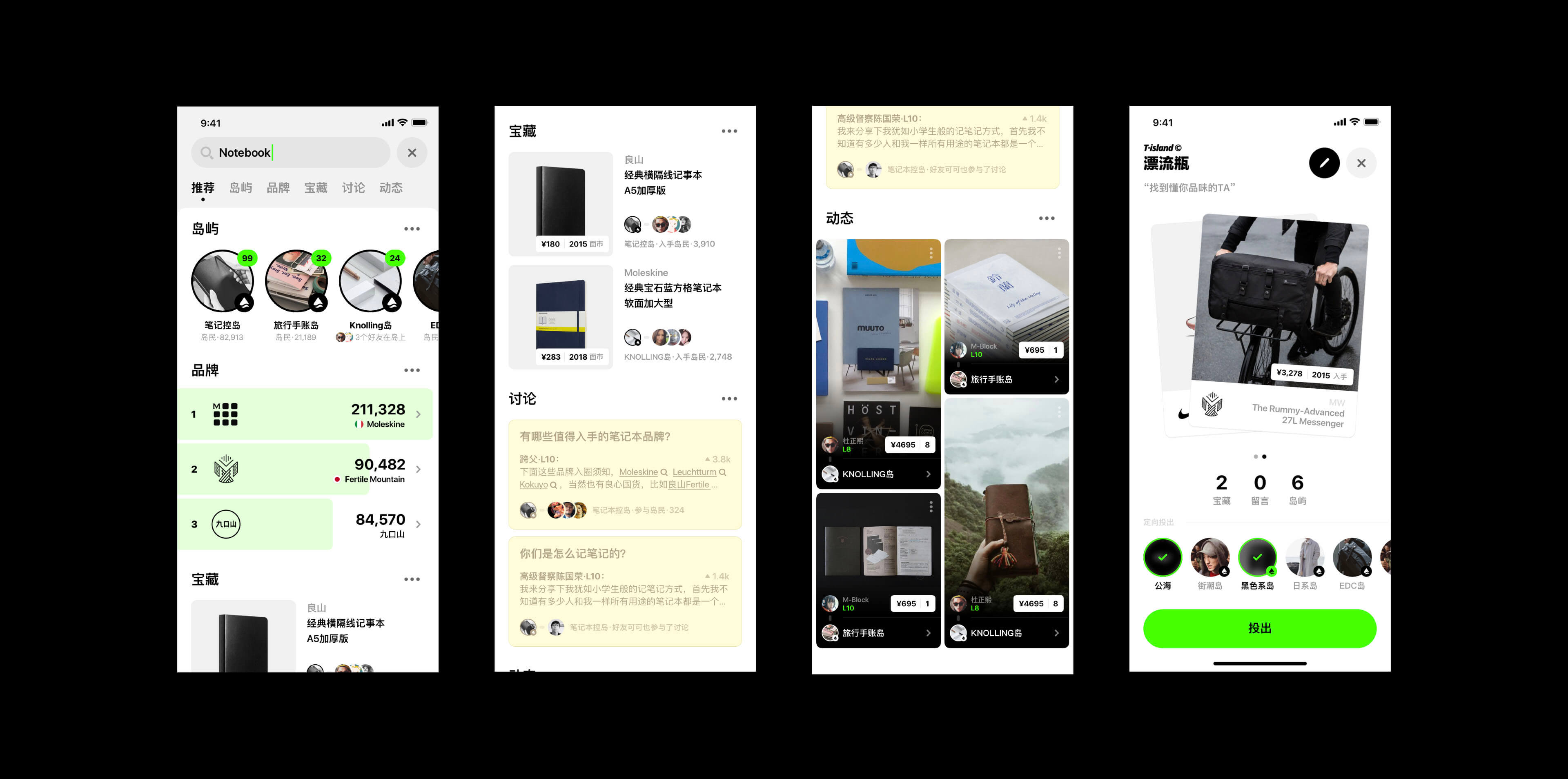
Tisland © Search & Floating Bottle ↑
Unlike the “search” of the mall type e-commerce products, tisland's search results are divided into the islands (i.e. cultural context), the summary of brands mentioned in the posted content, the treasures endorsed by the peer group, related topics, and the content posted by the peer group where the query words are mentioned.
The Floating Bottle feature allows users to find similar peers who have consumed the same content as themselves, i.e. "find him/her who understands your taste".
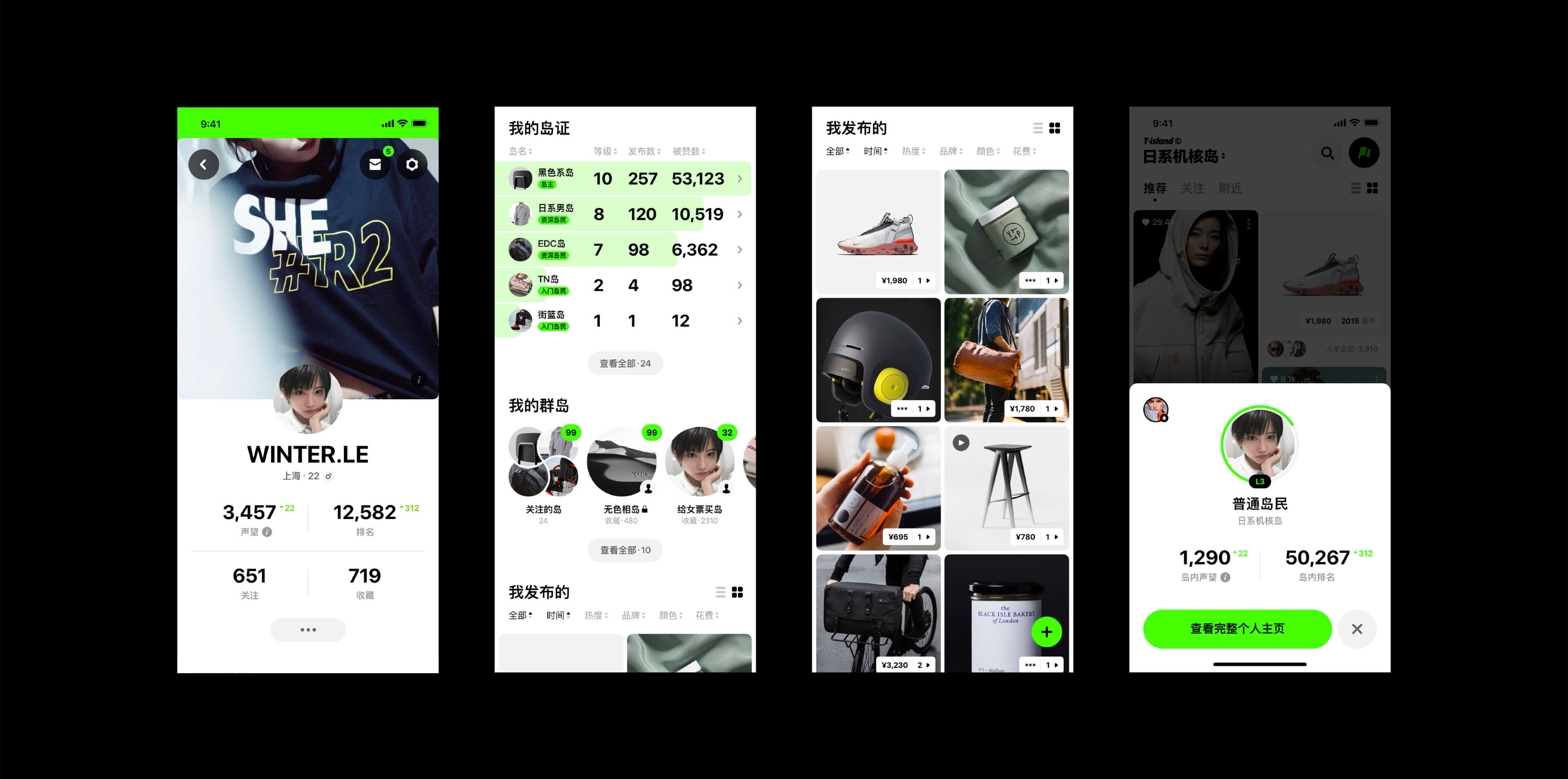
Tisland © Me ↑
Users in tisland build their personal reputation in various cultural islands by posting content to gain interaction with fellow users. A person's interests and tastes are often diverse, being very experienced in culture A while just starting out in culture B. Therefore, users have an island passport, which gives them different in-island reputations and rankings for their contributions in each culture island.
Keke LE
Alibaba Group © All rights reserved.
The certain content or data have been hidden due to the undisclosure agreement.